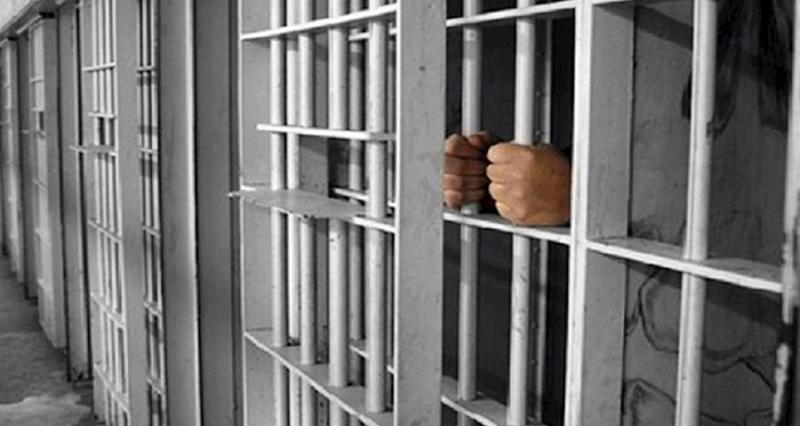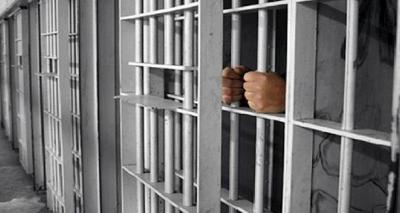An explosion in Lebanese prisons is inevitable if conditions continue as they are. Officials expect that the zero hour for the explosion of this ticking time bomb is near, although they do not know how the prisoners will choose to revolt against their reality. The tragedy of prison is old, and it has been worsened by the exacerbating economic crisis and its repercussions on the daily lives of prisoners inside the cells, on courts, and judges. Prisons face famine and hold all the factors for an explosion.
The state effectively provides its prisoners today with nothing but free shelter. These individuals live almost entirely on the support of their families, except for those who trade drugs inside the prison and hoard money to send back to their families. Similar to other basic materials, securing medications also falls on the shoulders of families, knowing that there are more than 800 inmates in Roumieh alone suffering from chronic illnesses (heart disease, diabetes, high blood pressure, hepatitis, nerves, etc.). Like outside the prison, medications are also lacking in prison pharmacies (health centers). Many detainees have suffered health complications due to taking inappropriate medications that do not match their health conditions, and some patients have suffered heart attacks that led to their deaths. Some families manage to secure medications for their children, while many others are left to fate because their families cannot even visit them.
While sick prisoners in Zahle prison complain about being denied the entry of medications, some families that "Al-Akhbar" spoke to confirmed that several charities are responsible for supplying prisons with medicines, "but the quantities do not arrive in full and are subjected to theft by the security personnel." A prisoner in Roumieh recounts that patients suffering from migraines, dental issues, and bone problems are enduring severe hardships, "and we have gotten used to hearing their groans because the medications that these people are accustomed to are no longer available. The pharmacy staff give us pills whose names we do not know and that do not relieve the pain."
He confirms that this has driven some to use narcotic pills that are purchased from inside the prison to alleviate their suffering, particularly as on-call doctors have become few and far between. "For example, a dentist used to come once a week; nowadays, he comes only once a month. Some wait for their turn in vain, and the doctor confirms that many medical supplies are unavailable, while those that are available are of poor quality." Those who need urgent surgical operations have been abandoned by the state. If a person is transferred to the hospital in an emergency, the hospital administration requests payment in "fresh dollars" from their family; otherwise, they are sent back to their cell to die there.
A prisoner suffering from blocked blood vessels reveals that he is waiting for "charity" to bear results; otherwise, his fate will be like that of his fellow inmate "Abu Naeem," who died in prison before securing the required amount for his surgery! Medical neglect has led to a rise in the mortality rate inside prisons. About 15 prisoners have died since February. Inmates share stories about "dying between two doors," between the outer and inner doors of Roumieh prison, as their colleagues who suffer heart crises wait for hours to be taken to the pharmacy and then for permission to be transferred after contacting the hospital and waiting for an ambulance to arrive. "More than 10 prisoners have died here," one inmate says, pointing to unfulfilled promises from prison management to secure an oxygen machine, a heart resuscitation device, and an emergency first-aid room for heart patients, "but we have not seen anything. What we see are repeated death cases in the same way and for the same reasons." One recounts how an Egyptian prisoner died months ago: "His color turned blue, and we saw foam coming out of his mouth. We began banging on the doors and shouting for help. The man did not leave Roumieh in an ambulance that arrived too late; instead, he died among us."
Some firmly believe that there are forces suppressing the strength of prisoners and preventing them from declaring "revolution." Days ago, a fire broke out inside building "D" in Roumieh prison after some inmates revolted in response to the collapse of a detainee due to not being taken to his interrogation session. Security forces quickly subdued the riot and transferred the detainee to building "W," where solitary cells are located. Consequently, some attribute the delay in the prisoners' uprising to fear of torture and the entry of riot control teams that have caused injuries and health crises for a large number of prisoners during their previous incursions. Others are confident that "a trick" has been used to introduce large quantities of drugs to sedate them and prevent them from revolting.
Many prisoners confirm the widespread presence of narcotic pills between the cells, especially in Roumieh, while some families speak of their concern over their children's instability during visits or phone calls, even though they did not use drugs before their imprisonment. Thus, the state applies its own version of the carrot-and-stick policy, without proposing a fundamental solution to the prisoners' crisis, with some even wishing for death over "a life of humiliation."
One official laughs when pointing out that there are detainees imprisoned for fines not exceeding 100,000 Lebanese pounds, while the cost per prisoner to the state is estimated at no less than one million pounds daily, covering water, electricity, food, medical care, and medications for over 8,000 prisoners spread across 25 penitentiaries (about 6,000 in Roumieh, which is designed for only 1,050 prisoners) and over 1,500 detainees in detention centers and courthouses affiliated with the Internal Security Forces (these figures change daily). Notably, more than 30% of Lebanese prisoners and detainees are Syrian.
Overcrowding has become synonymous with prisons, especially with reports indicating that occupancy rates exceed 300%. Some detainees report sleeping in a "side-sleeping" position due to the excessive numbers in most central prison cells exceeding their capacities. Roumieh prison is one of the vivid examples, with the number of inmates in a single room reaching about 53, while the prison accommodates twice its capacity, which does not exceed 600 prisoners.
Prisoners in Roumieh mention cells resembling “seven-star dormitories” housing 6 to 7 individuals, while other cells contain more than 15. This situation occurs in most prisons that engage in "packing" inmates, perhaps with the exception of Zahle prison, which is deemed better than others as it is modern and thus easier to enter, with cleaner cells. The discrimination among prisoners does not stop at cell conditions alone. Some mention social and sectarian differences between one wing and another and between buildings. This is exactly what happens in Roumieh, where authorities are making efforts to curb sectarian conflicts within. Thus, Sunni prisoners (regardless of their charges) have their own dedicated building, "Building B". Meanwhile, the majority in "Building D" are Shia, with a few Christians, while the "youth" and the six detention centers are predominantly Christian, and the "Building of the Convicted" is evenly distributed between Christians and Shia.
Prisoners report that conditions in "Building B" are better than elsewhere due to the financial means of some inmates, positively impacting the situation of others. This was witnessed for instance during Eid al-Adha when inmates from Building B distributed sacrificial meat to those most in need, while prisoners from other buildings have been deprived for "over a year and a half," according to one prisoner. This is true for most inmates across jails, who mostly receive only one type of food, especially since officials prohibit the entry of food items into central prisons for fear of them being mixed with narcotics. This places significant financial burdens on families.
More than one inmate notes that the "usual breakfast" consists of labneh (strained yogurt) and sometimes jam. However, the amount of "morning ration" (the meal) is insufficient for more than one sandwich because the amount of labneh does not exceed two or three tablespoons, while they have been deprived of cheese and eggs. As for lunch, it includes chicken for about three days a week, but the quality of the food is poor. The flour crisis has also impacted the inmates, as each now receives two loaves of bread daily, some of which may not be fresh, while meals are limited to breakfast and lunch only.
In contrast, one official claims that "prisoners live in conditions better than those enjoyed by free citizens," claiming that "the quality of food is excellent." The "well-off" inmates buy food and vegetables from the "store" (prison shop). However, with the rising prices of goods and many families reducing their visits, these individuals have started relying on "arawana" (government rations) and disregarding the store due to its exorbitant prices, which reach two times those outside of prison. A prisoner in Zahle states that the price of a gallon of oil, whether 1.5 or 2 liters, reaches 300,000 pounds, while outside it is no more than 120,000.
The "store" is simply a contractor supplying food and cleaning materials, and many speak of corruption in tenders that benefit companies linked to political factions. The high prices have led "Fried" (a pseudonym) and his peers in the "dorm" to resort to replacing the purchase of water boxes from the "store" (now costing 50,000 pounds for five big bottles) with tap water, which is unsuitable for bathing causing skin rashes and various types of allergies and has even led to the spread of scabies in some cases.
Fried confirms that when visiting the "pharmacy" (the medical center inside the prison), on-call doctors affirm that the issues stem from water contamination and food quality, along with a lack of sun exposure. He explains that he boils the water, which usually has a brown or reddish hue, to reduce the bacteria present in it, "and we also boil it for longer periods so we can drink it,” noting that boiling does not resolve the crisis, as inmates are currently suffering from recurring sand attacks, which doctors attribute to the stagnant water they are drinking.
Rida Al-Salh, the spokesperson for the families of prisoners and member of the Families of Detainees Association in Lebanese prisons, emphasizes that some prisons regularly suffer from water shortages, which drive the inmates to revolt. One prisoner in Tyre prison also asserts that the water is almost always cut off. In contrast, the General Directorate of Internal Security denies this reality and claims through one of its officers that it has contracted specialized companies to secure water in case of shortages and has installed filters in tanks to ensure water quality, denying there being any stagnant water issues or any problems, claiming that there is no scabies in prisons, but rather skin sensitivities stemming from the lack of cleanliness of some inmates.
If prisoners are suffering from water shortages like citizens enjoying freedom outside, they also live in darkness most of the time. This incurs additional costs for them as they are forced to throw away food and groceries kept in refrigerators and then buy new supplies. One prisoner in Roumieh states that power outages "extend for long hours, increasing our discomfort especially since we are crammed in the rooms." Meanwhile, another detainee in Zgharta notes that the prison is underground, "and you can imagine our misery during summer amidst power outages." This is a similar circumstance experienced by inmates in Al-Quba prison, also located underground and heavily overcrowded, where inmates report a "significant problem" due to a lack of cleanliness and the foul odors emanating from the place. Families of some detainees in "Fakhr Al-Din Prison" have resorted to providing fuel on their own expense so that the prison officials can operate the generator for their sons!




